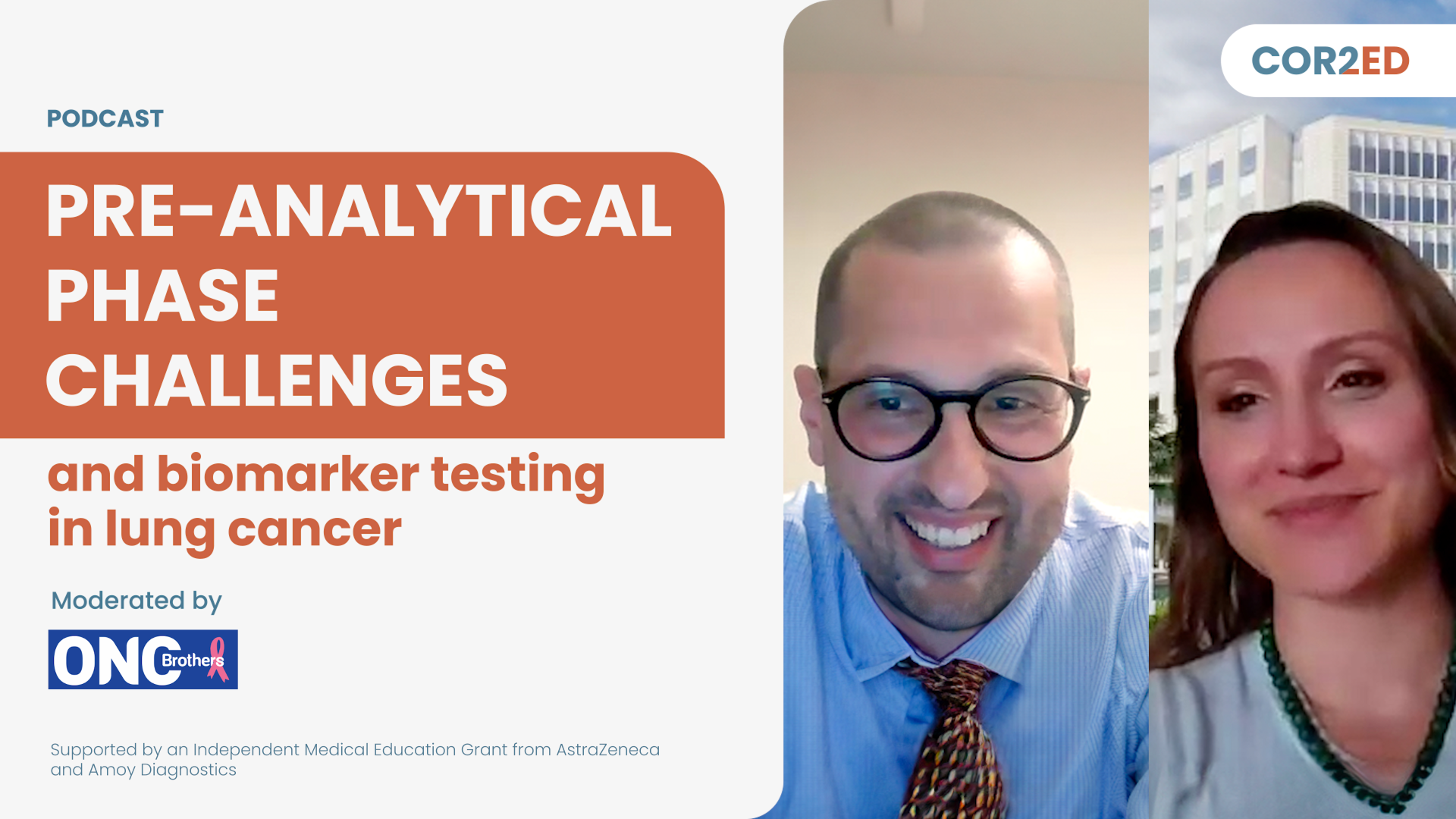Podcast Transcript
Prostate Cancer: Pre-Analytical Phase Challenges and Biomarker Testing
Moderated by:
Drs. Rahul and Rohit Gosain, the Oncology Brothers
Brought to you by:
Dr. Alexander Wyatt, GU Cancer Genomics Expert, Vancouver Prostate Centre, University of British Columbia, Canada
Dr. Petros Grivas, Medical Oncologist, University of Washington and Fred Hutchinson Cancer Center, United States
Introduced by:
Tonke de Jong, COR2ED
Please note:
PRECISION ONCOLOGY CONNECT podcasts are designed to be watched and/or heard. If you are able, we encourage you to listen to the audio, which includes emotion and emphasis that is not so easily understood from the words on the page. Transcripts are edited for readability. Please check the corresponding audio before quoting in print.
This podcast is an initiative of COR2ED and developed by PRECISION ONCOLOGY CONNECT, a group of international experts working in the field of precision oncology. The podcast is supported by an independent educational grant from AstraZeneca and Amoy Diagnostics.
The views expressed are the personal opinions of the experts. They do not necessarily represent the views of the experts' institution, or the rest of the PRECISION ONCOLOGY CONNECT group.
For expert disclosures on any conflict of interest please visit the COR2ED website.
Tonke de Jong (COR2ED)
This is the first podcast episode in a three-part series. In this episode, we focus specifically on prostate cancer.
This podcast is an initiative of COR2ED and supported by an independent educational grant from AstraZeneca and Amoy Diagnostics.
COR2ED is honoured to introduce to you the Oncology Brothers (Rahul and Rohit Gosain), moderators of today’s discussion, and two internationally renowned experts, Dr. Alexander Wyatt, GU cancer genomics expert and Dr. Petros Grivas, medical oncologist.
Dr. Rahul Gosain (Oncology Brothers)
Hello, everyone. I am Rahul Gosain,
Dr. Rohit Gosain (Oncology Brothers)
And I'm Rohit Gosain.
Dr. Rahul Gosain (Oncology Brothers)
And we are Oncology Brothers. It's an exciting time to be practising as a General Medical Oncologist as we get to appreciate all the advancements and see this field move ahead, particularly when it comes to precision medicine. However, we face some real challenges, including how to select the right biomarker, be it for prostate cancer or lung cancer or ovarian cancer.
In this podcast we'll focus on pre-analytical phase challenges and the importance of understanding the pathology for prostate cancer to make the right decision for our patients. For this, we are joined by Dr. Alexander Wyatt, Professor of Urologic Sciences at the University of British Columbia, and Dr. Petros Grivas, Clinical Director of the GU Cancer Programme at the University of Washington. Alex, Petros, welcome.
Dr. Alexander Wyatt
Thank you Rahul, thank you Rohit.
Dr. Rohit Gosain (Oncology Brothers)
Before we start, let's clarify this term, 'precision medicine', as that can be very confusing. And before we dive into it any further, Alex, if you don't mind talking about what is germline and somatic mutations.
Dr. Alexander Wyatt
Yes, of course. Pleasure to be here and thank you for the kind introduction.
I think it's really critical that we set up the right terminology here. So, a germline mutation is an alteration that's inherited from your parents, so it's actually present in every cell in your body. Whereas a somatic alteration is something that's only in the cancer cells. And the vast majority of things that we study are only in the cancer cells but those germline mutations are pretty important as well.
Dr. Rahul Gosain (Oncology Brothers)
Alex, thank you. Let's continue with this and take this a little further. Petros, as a treating physician, what are the various biomarkers in prostate cancer we should test for and what tests can be used for this information?
Dr. Petros Grivas
Thank you so much. I appreciate always the opportunity to work with you and discuss it with you, and of course, having Alex is fantastic.
In terms of the biomarkers in prostate cancer there is, of course, a lot of data coming up in the last few years, and those data sets have been informing the way we try to use biomarkers in clinical practice. I start by saying that with FDA approval of PARP inhibitors, for example, olaparib based on the PROfound trial, there is also rucaparib based on a different trial, and of course we have seen data with both PARP inhibitors as monotherapy, and we showed data, for example, from Dr. Hussain of the PROfound trial before and we saw Dr. Bryce presenting more recently the rucaparib versus taxane trial. And of course, we more recently had three clinical trials looking at the combination strategy of a novel anti-androgen plus PARP inhibitor. Very quickly for the audience, those three trials include the PROpel study and this was abiraterone plus olaparib. We had the MAGNITUDE trial with abiraterone and niraparib and more recently Dr. Agarwal presented the TALAPRO-2 trial with enzalutamide + talazoparib.
So, we have overall many data sets, again trying to evaluate the efficacy and safety of PARP inhibition either as monotherapy or in combination with novel anti-androgen in metastatic prostate cancer, specifically in this castration resistant prostate cancer setting. And overall, I would say the important impact, I would say on the testing is that we need to test for DNA repair gene alterations or to be more precise in terminology, DNA damage response in alterations.
Also, relevant to check for something which is very rare in prostate cancer, which is MSI-high status. This is probably less than 5%, I would say. But if it's present, I think it definitely opens the door for checkpoint inhibition, which MSI-high is probably one of the most robust biomarkers for checkpoint inhibitor efficacy across the board. And you can argue that high TMB may or may not be relevant. There is a debate about that, especially prostate cancer, that is a kind of across the tumour types indication based on high TMB, I think a MSI-high is probably a more robust biomarker than TMB but TMB is something we usually almost always get when we send an NGS platform.
So just to wrap up this long answer here, DNA damage response genes should be tested. Again, look at the approval label of olaparib as a guide and the MSI-high, TMB are always important across tumour types, I would say, and obviously other targets might be relevant for clinical trials if there are specific targets to look for in individual genes. But I think in terms of clinical practice, these are the highlights. Sometimes we may order broader gene platform to look for other genes as well, again, mainly to look at potential prognostic biomarkers PTEN loss, Rb1 or p53. However, those, particularly the one I just mentioned, do not have a relevant drug going after it right now, but we're doing clinical trials trying to design therapeutics targeting those molecules.
Dr. Rohit Gosain (Oncology Brothers)
Thank you so much for covering that important segment, Petros. So, when you mention DNA repair genes, predominantly what we are talking about is BRCA1 and BRCA2, where we have seen significant responsiveness with PARP inhibitors and earlier and earlier, we are utilising these drugs and many clinical trials are incorporating this data as well. Now there are some trials, especially with Dr. Agarwal presented, where these drugs are performing without any DNA repair genes which are not even part of genetic mutation or somatic mutations. That is exciting, but still more work needs to be done.
Alex, from your perspective, what challenges are commonly experienced in prostate cancer biomarker testing that impacts the quality of these results?
Dr. Alexander Wyatt
As Petros mentioned this, we're really focused on identifying these mutations in DNA damage repair genes. Now they're only present in somewhere between 10% of patients and 25% of patients, depending on how many genes we're checking. Now, one of the key challenges is that although, as Petros mentioned, there's a clear need for treatment selection in the castration resistant setting to be testing, we also know that those mutations are important earlier in disease, both to tell you about prognosis because something like a BRCA mutation is associated with a really aggressive disease, so a bad prognosis, and also about hereditary cancer in other family members. So, it's really important to test for germline mutations to find out if unaffected family members could be at risk of, say, breast or ovarian cancer. And so that kind of presents challenges because there's no single time points throughout the disease spectrum that you should trigger testing. And we typically think, okay, order a test as soon as you can, as soon as a patient is eligible to be tested in your jurisdiction, get it done. But it means that I think, you know, there's a little bit of discretion used.
Now, the biggest challenge is that because you want to look for both cancer related mutations, those somatic changes, and the germline mutations, you really need to test tumour tissue because that carries both of those types of alterations. Now, in prostate, there's really only one predominant source of tissue and that's a biopsy from first diagnosis. And so, I think as many can recognise, that's a small amount of tissue. It's typically archival. So that means it's been kept for many years, sometimes in a hospital drawer and not ideal conditions. And it may not necessarily represent what we think of as the dominant metastatic lesion in a man with disseminated disease. So really the main challenge is about access to tissue and whether that tissue is kind of sufficient quality for sampling and of sufficient representativeness, whether it represents the metastatic disease itself.
Dr. Rahul Gosain (Oncology Brothers)
Alex, thanks for touching on some very key points. When we're talking about germline tissue, knowing that information is not only important for the patient sitting right in front of you, but that can change what's important for that family member that's right there for their patient. So, knowing that information is important for the patient because, yes, we're looking for more treatment options, but it makes a significant impact for that family as well. And then you brought up the tissue analysis. I also think it's important to recognise reducing the pre-analytical errors, these are the errors that occurred before the analysis even happens, which can result in poor results overall.
Alex, you touched a little on the storage or how to get these biopsies. For prostate cancer and biomarkers, is there something bare minimum that you expect from us to provide you so that you were able to use that tissue and get this information to us?
Dr. Alexander Wyatt
So, when we think about prostate tissue, one of the challenges is that when you're at the point where you're thinking about treatment selection for a patient of CRPC, you're not really in control of that biopsy tissue necessarily unless you're considering a fresh metastatic biopsy, which is reasonably unusual outside of a large academic centre. So, what you've got to do is retrieve a tissue block as soon as you can and so think about testing as early as possible, and then ideally have a dedicated GU pathologist or a pathologist with significant experience looking at prostate cancer tissue to do the block review and then the sampling of tissue.
So prostate cancer, when it's in the prostate gland, is quite heterogeneous and there's often, you know, lots of stroma, lots of non-cancer tissue and different regions of low- and high-grade disease. So, it's really important that a pathologist selects what they can see as probably the dominant lesion in that, within the glands, the highest grade, highest volume, highest tumour cellularity region, because if that doesn't happen, you know, we can have problems with tissue insufficiency when we get to the actual test itself.
Dr. Rohit Gosain (Oncology Brothers)
Now when you have this information, Alex, how often are these biomarker test failures and what is the real solution for this? Do you go after re-biopsies, especially when you're working with scant tissue and when you're dealing with elderly population here?
Dr. Alexander Wyatt
Yes. So, when we look at trials such as the PROfound trial that Petros mentioned, the failure rate for sort of testing prostate biopsy tissue with the types of tests that were available at the time, was something in the range of 40%. So that's a really high screen failure rate. Now, many tests have tried to improve those over time. So, there's others that will accept a lower yield of DNA from the tissue or a lower tumour cellularity. But there's still a very significant failure rate. I don't know if Petros, you could speak to what you're experience in kind of real-world practice in terms of those failure rates?
Dr. Petros Grivas
Great discussion. I agree with you that overall it depends a lot on the actual tissue adequacy. Of course, you know better than me time to fixation. You know, especially over the years pathologists have become better I think, in handling those tissue and they're shortening the time to fixation and of course trying to deal with a lot of political factors. Right? That may impact the actual adequacy and quality of material. And I think over the years, I think we're becoming better and better. And another example which is relevant to the discussion is that conventionally over the years we thought that bone biopsies were not amenable to tumour NGS, genomic testing, and I think more recently we are realising that at least in some centres, again, depending on those pre-analytical factors and also depending on what acid is being used for decalcification of the bone, often, or at least much more often than before, we're now able to perform next generation sequencing in both biopsies. Obviously, it's more difficult on the soft tissue from a tumour of prostate, but it's becoming more common.
So overall, to answer Alex's question, I think it's becoming less and less of a problem not to have adequate tissue. I think most of the cases, even if it's an archival tissue of a prior prostate biopsy or prostatectomy, I think most of those cases have adequate tissue and results seems to be interpretable. I have to go back and look at the literature to see the failure rate but anecdotally I would say the vast majority of samples can be tested. And internally, Alex knows that because he is a major leader in the field, we have the UW OncoPlexTM study, which is an internally developed assay by Dr. Colin Pritchard and others, at the University of Washington, and we have this precision oncology tumour board once a month. Obviously, these are selected cases who have had enough material to work with, but just by talking to Colin and others, it seems that the majority of those tissues are amenable to testing.
Dr. Rahul Gosain (Oncology Brothers)
I think it's important, I keep hearing about the right pathologist, tumour boards, getting our urologists to access the prostate gland, intervention radiologist going after the bone biopsy. This is a team approach. I really think it is so important to emphasise the multi-discipline approach when you're treating prostate cancer.
Dr. Petros Grivas
Medicine is a team sport, oncology is a team sport and prostate cancer management is a team sport. We need everybody on board. We need all hands on deck, as I say. And this includes, of course, urologists, medical oncologists, radiation oncologists, pathologists, radiologists with expertise. And as an example here, and Alex knows this, we have a multi-disciplinary prostate cancer tumour board, which is a clinic actually on every Thursday morning. And we see patients maybe with high risk localised prostate cancer or metastatic disease. We try to give the best experience to the patient with a 'one-stop shop', let's say, having all these different disciplines at the same time, this offers significant multi-expertise and also interaction among them. And I think this results in a great patient satisfaction and I believe in better patient care because you have the opportunity to interact in a timely manner.
Obviously, we have to be realistic and not every cancer centre in the country, let alone in other countries with less resources, have that ability. And that opens that whole other issue of global oncology. But I think if in the areas where expertise are present, I definitely highly value the importance of multidisciplinary and interdisciplinary prostate cancer care.
Dr. Alexander Wyatt
I think one, one practical example of that is that for urologists I've seen a trend when they're seeing a patient presenting with metastatic disease, I think historically there would only be the thought that, okay, well we'll just take one biopsy core for a primary site just to confirm this is prostate adenocarcinoma. But now I think because of the interaction in oncology, there's now a thought that, well, maybe we'll need some tissue downstream to do testing. And so, there's a little bit more consideration to maybe collecting more cores from the primary site or making sure there's a targeted biopsy to try to hit the kind of a key lesion there.
So, I think that's an example of where the multidisciplinary clinics lead into practical changes that will help you downstream when you suddenly say, okay, I need tissue for testing.
Dr. Rahul Gosain (Oncology Brothers)
Is there a minimum number of core that you expect your urologist to get? I know when it comes to things like colon cancer, we often say anything less than 12 lymph node dissection is inadequate. Is there a minimum number of core biopsies that you have your urologist go for?
Dr. Alexander Wyatt
I would say at least 2. The problem is that 1 prostate biopsy core is 1mm in width, it is very easily exhausted, even just for clinical diagnostics. So, you know, two gives you a little bit more wiggle room.
Of course, when you think about patients that are diagnosed with localised disease, there's often template biopsies of 12 up to something like 36 different cores. Right? So somewhere in between for a patient that's presented with metastatic disease is probably okay. But I think what we don't want to be doing is just taking one random biopsy of the primary site, or even something that I do see historically that happened is a just a working clinical diagnosis without even tissue collected at all, which might happen for patients with really high PSA and bone lesions.
Dr. Petros Grivas
To that point, I totally agree with Alex. I think it's super helpful to have that discussion upfront, and again, that kind of help results in adequate tissue and that scenario that Alex mentioned where you don't have a tissue biopsy is not common. As Alex mentioned, it's probably rare, but there are some scenarios of patients that get admitted with no diagnosis, a workup is being done. Multiple bone mets are found like a super scan scenario. The patient is in treatment right away. PSA is like 500, a random number, and no other primary tumour is found. So, in those scenarios you may end up with a rapid treatment initiation. But I think, as Alex pointed out, the effort is to have tissue for diagnosis, which is usually essential in the vast majority of cases, and also having the opportunity to do what we discussed before, tumour somatic testing on a tumour tissue, which is very important for risk stratification / prognostication, but also treatment options, as we discussed, especially if the disease evolves later to metastatic castration resistant prostate cancer setting.
And this discussion reminds me of bladder cancer. Sometimes people ask me, when do you do tumour somatic NGS for urothelial carcinoma, and I say at the time of that metastatic disease. We should do that to have it available down the road. In prostate cancer, I think we move it earlier and earlier. I think germline testing, as Alex mentioned, is indicated now in guidelines even in high risk localised prostate cancer and all metastatic.
So, germline testing is I think probably across the board is becoming a routine standard for the vast majority of patients, at least we should do it with high-risk, localised metastatic and tumour somatic testing is definitely very, very important and impacts practice in CRPC setting metastatic. And I think down the road, Alex, tell me what you think, we're moving towards an era in the future that patients may come in that will get somatic and germline testing upfront and that may become a reality across tumour types. We're not there yet, but I think we're probably heading in that direction in the future.
Dr. Alexander Wyatt
Yeah, that's why I think we're really striving towards a model where we test patients at the earliest possible time point. I think if we talk about tissue testing for both somatic and germline alterations, it can take a couple of months to even source a tissue block, especially if they're in a different state or province, or a different country. The patient's moved and then the test itself can take several weeks and maybe you get a failure at that point. So, you need to retest or test an alternative source of material. So, you really want ideally months, you know, on the table. And so, I think for a patient that means at first metastatic progression or potentially, you know, if we're thinking about germline only testing, then as Petros said, even in the high risk, very high-risk localised setting.
Dr. Rohit Gosain
I couldn't agree more with everything that you guys have been talking about, especially when we need more tissue, when we tie in with somatic testing. Now we are lucky enough that liquid tissue testing also is very much available and gets us more faster diagnosis and a quick turnaround time. Now when talking about on progression versus first line treatment options, Alex, this question is for you and then moving on to Petros after that, where who is responsible from your perspective to get the tissue the first time for NGS and Petros, do you test these patients on progression or rely on what the NGS was on the prior specimen?
Dr. Alexander Wyatt
In terms of the, triggering the tissue test, that's going to be the treating physician who is seeing the patient at that time. Now, sometimes that might actually be the urologists, especially if it's a patient in the hormone sensitive setting. I think more commonly it's the oncologist.
And then, you know, the same is true for liquid biopsy testing as well. So, when we talk about liquid biopsy, what we're really talking about is testing circulating tumour DNA in the blood, and that's largely representative of the metastatic lesions themselves.
The key challenge with ctDNA testing is that you don't have a pathologist to look down the microscope and tell you there's tumour DNA here or there is not. But a rough guide is that when a patient is receiving treatment and responding to treatment, there'll be very low levels of ctDNA. So that's a bad time to do a liquid biopsy test if your goal is to genotype the cancer to look for mutations. The key times are kind of those intervening periods where disease is progressing, you haven't started a new line of treatment. So that's why in prostate cancer, we really think about at the time of castration resistant progression, that's the really good point to trigger a liquid biopsy test. If you have kind of questions about your tissue result, where you couldn't get tissue data, then retesting at CRPC is a key opportunity.
Dr. Petros Grivas
Great point by Alex. I think, you know, it's interesting philosophically and practically, think about the tumour heterogeneity and how when we recapitulate that or analyse that in the clinical practice and translate that analysis into a clinically actionable result, that can help patients' treatment. And I think the whole field of oncology is struggling with this. Alex is leading the field and, personally, I see value in both tumour tissue analysis and circulating tumour DNA, especially if an assay is robust enough, validated, because I think the pre- analytics and the analytical validity of an assay is very important and not all the assays are created equal. We have to be very careful how we interpret an assay and this is a whole other discussion. Once a month, we have our precision tumour board, I learn a lot and I'm technically an expert in the field, but I'm learning every time. I really admire, seriously I respect so much our friends and colleagues in community oncology where they have to treat so many different cancer types. This is amazing. But how difficult is at the same time to delve into the details and nuances of a somatic tumour test or even germline testing of a prostate cancer patient? What the nuances are in this report. So overall I would say tumour tissue is definitely something we use and ctDNA is becoming more and more important. Alex has done so much work on this and in our centre we would try to send both, we send tumour tissue and ctDNA. We have a PSA threshold to send ctDNA, because, you know, we think that the higher the PSA, the higher the time to have yield detectability of ctDNA, especially in the classical variety of prostate adenocarcinoma. So we have the threshold to trigger ctDNA. And we think that by doing both, we may capture more heterogeneity of disease and potentially additional findings, and we try to also do a germline sample at the same time if the patient consents. It's a study so we can analyse both somatic and germline at the same time.
The other thing I would say is if you have a very poorly differentiated, undifferentiated or, you know, like neuroendocrine feature of prostate cancer, you do not have much PSA. We may still collect ctDNA in those cases with lower PSA thresholds because the disease may not be as much AR-driven and so the PSA may not be that high.
Dr. Rahul Gosain (Oncology Brothers)
Thank you for touching on those critical points. I'm going to actually switch gears. We touched on global oncology briefly, Alex, you're a practicing physician in Canada, Petros, Rohit and I are here in the U.S. Part of the audience listening to this is in Europe or the rest of the world. Any differences in clinical practices when it comes to biomarker testing and these different regions Alex?
Dr. Alexander Wyatt
There's some important differences from jurisdiction to jurisdiction and even within certain regions.
So, I would say, depending where you are in the world, really review closely the guidelines, the clinical guidelines that are most suitable to your practice. So, in the U.S., that may be the NCCN guidelines, in Europe that may be the ESMO or EAU guidelines, in Canada we have our own Canadian Urologic Association guidelines. And now, where they differ is in the ideal timing of testing. So, they may say only do testing in the CRPC setting or maybe broader, about earlier in disease. So, they differ on the timing and they also differ on the genes that you should be testing. Now, as we touched on earlier, the key genes, BRCA2, BRCA1, ATM, they're almost always recommend to be tested. But it's those kind of rarer alterations that you may see in only 1 or 2 patients in 100. They are kind of a little bit more variable from jurisdiction to jurisdiction, based on kind of economic equations to understand the value of testing in different patient populations.
I think the other thing that's important to recognise is that the actual mutation rates in these genes vary from region to region. In some populations you can have BRCA2 mutations at the germline level in 10% of patients. In others it may be only one or 2%. So, we don't necessarily have a complete grasp of that because not all populations have been equally studied or equally represented in varying databases. But yeah, I think really important is to understand your own local guidelines and what they recommend and recognise that they may be changing from year to year.
Dr. Rohit Gosain (Oncology Brothers)
And I want to stress the importance of everything that you said, Alex, and how important it is to test for these NGS mutations, whether it's on liquid or solid tumour biopsy. We can be making headways with newer drugs and newer achievements with these survival curves differentiating. But until, unless we are utilising this testing in our daily practices, this will be of no use.
We have covered some critical data, including the pre-analytical phase errors and importance of right biomarker testing. Alex and Petros, thank you so much for joining us. To our listeners, keep an eye out for similar discussion in lung and ovarian cancer space very soon. We are the Oncology Brothers.
Tonke de Jong (COR2ED)
Thank you so much for sharing these important messages. We’ve discussed a lot and I take with me that there are various ways to optimise prostate cancer samples.
If you liked this episode, then please look for the other episodes in this series coming soon on the Oncology Medical Conversation podcast, under the account of COR2ED medical education, where we discuss lung and ovarian cancer.
If you are interested in finding out more about precision oncology, then please visit COR2ED.com and select Oncology. If you liked this podcast, then don’t forget to rate this episode, subscribe to the channel, or inform your colleagues about it. Thank you for listening and see you next time.
This podcast is an initiative of COR2ED and developed by PRECISION ONCOLOGY CONNECT, a group of international experts working in the field of Precision Oncology. The views expressed are the personal opinions of the experts and they do not necessarily represent the views of the experts' organisations, or the rest of the Precision Oncology CONNECT group. For expert disclosures on any conflict of interest please visit the COR2ED website (COR2ED.com).















 Downloadable
Downloadable  5 MIN
5 MIN
 Jun 2025
Jun 2025 






